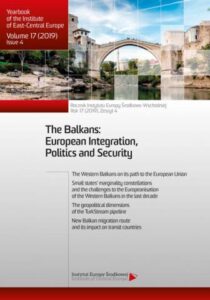ORCID: Kinga Smoleń: 0000-0003-2564-5190
Pages: 101-121
Edition: Lublin 2019
DOI: https://doi.org/10.36874/RIESW.2019.4.5
Citation method: K. Smoleń, The geopolitical dimensions of the TurkStream pipeline, „Rocznik Instytutu Europy Środkowo-Wschodniej” 17 (2019), z. 4, s. 101-121, DOI: https://doi.org/10.36874/RIESW.2019.4.5.
Keywords: energy security, geopolitics, natural gas, Russia, Turkey, TurkStream
Abstract:
The empirical goal of this paper is to conduct an analysis of the geopolitical dimensions of the TurkStream pipeline, with special consideration given to its determinants as well as a diagnosis of the geopolitical implications of its geographical extent. To explore this problem, the following hypotheses are offered. First, the inauguration of the second branch of the TurkStream pipeline in the beginning of 2020 will strengthen the monopolistic position of Russia as a supplier of natural gas to the countries of the European Union. This will increase the dependency of the EU on Russia and severely hamper its ability to formulate a unified, cohesive energy policy. Second, two factors that underlie the geopolitical importance of the TurkStream pipeline are Turkey’s and Southern Europe’s natural gas needs on the one hand and the political and economic interests of Russia, Turkey, and Ukraine on the other. Third, the TurkStream project should be seen as an instrument that serves to build a tactical partnership between Turkey and Russia – a partnership underpinned by the strategic interests of both countries in the Middle East. Fourth and finally, Russia’s gradual withdrawal from directing its natural gas through Ukraine will generate serious economic problems and potential energy shortages in that country. In the long term, this pressure is geared toward forcing Ukraine to re-evaluate the pro-Western trajectory of its foreign policy.
Bibliography:
Bartosik M., Ziemia w pułapce energetycznej, „Biuletyn Techniczno-Infor- macyjny” 2010, no. 2.
BP Statistical Review of World Energy, June 2018, https://www.bp.com/con- tent/dam/bp/business-sites/en/global/corporate/pdfs/energy-economics/ statistical-review/bp-stats-review-2018-full-report.pdf [14.09.2019].
Borkowski M., Bezpieczeństwo energetyczne w odniesieniu do Republiki Buł- garii, „TEKA Komisji Politologii i Stosunków Międzynarodowych” 2014, no. 9.
Commission of the European Communities, Green Paper. A Europe- an Staretegy for Sustainable, Competitive and Secure Energy, March 2006 (COM2006) 105 final, http://europa.eu/documents/comm/green_ papers/pdf/com2006_105_en.pdf [02.11.2012].
Commission of the European Communities, Green Paper. Towards a Euro- pean Strategy for the Security of Supply, November 2000 (COM2000) 769 final, http://eur-lex.europa.eu/LexUriServ/LexUriServ.do?uri=CEL EX:52000DC0769:EN:HTML [02.11.2012].
Commission of the European Communities, Second Strategic Energy Re- view. An EU Energy Solidarity and Security Action Plan, November 2008, COM (2008) 781 final, http://eur-lex.europa.eu/LexUriServ/LexUriServ. do?uri=COM:2008:0781:FIN:EN:PDF [02.11.2012].
Ćurčić B., Serbian gas sector in 2010, 21th Session of UNECE Working Party on Gas, Geneva, 18-19 January 2011.
Dąborowski T., Bułgaria: tańszy gaz z Rosji w zamian za zgodę na South Stream, Analizy OSW, 21.11.2012, https://www.osw.waw.pl/pl/publikacje/ analizy/2012-11-21/bulgaria-tanszy-gaz-z-rosji-w-zamian-za-zgode-na- -south-stream [15.09.2019].
Hebda W., Strategia energetyczna Republiki Serbii do 2015 roku, „Energetyka” 2012, no. 9, International Energy Outlook, EIA 2006.
Jakóbik W., Jakóbik: Turkish Stream 2, czyli pomysł Gazpromu na bezkróle- wie w Europie (Analiza), Biznes Alert, 14.03.2019, http://biznesalert.pl/ turkish-stream-2-analiza/ [17.09.2019].
Kardaś S., Rosyjski sukces gazociągowy: zakończenie budowy morskiej części TurkStreamu, Analizy OSW, 23.11.2018, https://www.osw.waw.pl/pl/pub- likacje/analizy/2018-11-23/rosyjski-sukces-gazociagowy-zakonczenie-bu- dowy-morskiej-czesci [16.09.2019].
Kędzierski M., Kędzierski: Czy polityka energetyczna Orbána to rozczarowa- nie?, CIRE.PL, Centrum Informacji o Rynku Energii, 21.03.2014, https:// www.cire.pl/item,90908,13,0,0,0,0,0,kedzierski-czy-polityka-energetycz- na-orbna-to-rozczarowanie.html [15.09.2019].
Langsdorf S., EU Energy Policy: From the ECSC to the Energy Roadmap 2050, Energy Roadmap 2050 – A History of EU Energy Policy, Green European Foundation, December 2011.
Lesser O., Changes on the Turkish Dimestic Scene and Their Foreign Policy Im- plications, [in:] Z. Khalilzad, I.O. Lesser, F.S. Larrabee (eds), The Future of Turkish-Western Relations: Toward A Strategic Plan, Santa Monica 2000.
Liuhto K., Energy in Russia’s Foreign Policy, „Publications of Pan-European Institute” 2010, no. 10.
Makhnonos M., Ukraine and Russia. Gas consortium: National deputies of opposition protest deal, „The Ukrainian Weekly” 2002, vol. 70, no. 41.
Misiągiewicz J., Bezpieczeństwo energetyczne Unii Europejskiej. Implikacje nowych projektów infrastruktury gazociągowej w Europie, Lublin 2019.
Młynarski T., Bezpieczeństwo energetyczne w pierwszej dekadzie XXI wieku. Mozaika interesów i geostrategii, Kraków 2011.
Młynarski T., Unijno-rosyjskie „gry gazowe”. Unia Europejska – Rosja: energetyczna współzależność czy nowa „wielka gra”?, „Gentes&Nationes” 2010, vol. 1.
Mohan C.R., Geo-politics and energy security, „Strategic Analysis” 1996, vol. 19, no. 9
PAP, Eksperci o Turkish Stream: To tworzenie infrastruktury, która będzie wzmacniać monopolistyczną pozycję Rosji, dziennik.pl, 28.07.2016, https:// wiadomosci.dziennik.pl/opinie/artykuly/527411,eksperci-o-turkish-st- ream-to-tworzenie-infrastruktury-ktora-bedzie-wzmacniac-monopoli- styczna-pozycje-rosji.html [16.09.2019].
PAP, Rosja ma nową doktrynę bezpieczeństwa energetycznego kraju, Biznes Alert, 14.05.2019, http://biznesalert.pl/rosja-doktryna-bezpieczenstwa- -energetycznego/ [14.09.2019].
Pietraś M., Autonomiczność bezpieczeństwa energetycznego w stosunkach międzynarodowych, [in:] M. Pietraś, J. Misiągiewicz (eds), Bezpieczeństwo energetyczne we współczesnych stosunkach międzynarodowych. Wyzwa- nia, zagrożenia, perspektywy, Lublin 2017.
Potulski J., Surowce energetyczne i linie przesyłowe jako przedmiot geopoli- tyki Morza Kaspijskiego, [in:] B. Bojarczyk, T. Kapuśniak (eds), Region czarnomorsko-kaspijski w stosunkach międzynarodowych, Lublin 2011.
Pronińska K., Zagrożenia i wyzwania dla globalnego bezpieczeństwa energe- tycznego, [in:] K. Księżopolski (ed.), Problemy bezpieczeństwa wewnętrz- nego i bezpieczeństwa międzynarodowego, Warszawa 2009.
RIA Novosti/P. Stępiński, Gazprom ułożył 300 km gazociągu Turkish Stream, Biznes Alert, 29.09.2017, http://biznesalert.pl/gazprom-ulozyl-300-km- -gazociagu-turkish-stream/1 [16.09.2019].
Smoleń K., Operation Olive Branch, „Facta Simonidis” 2019, no. 1 (12). Socor V., South Stream: Gazprom’s New Mega Project, „Eurasia Daily Monitor” 2007, vol. 4, no. 123, http://www.jamestown.org/single/?no_cache=1&tx_ttnews%5Btt_news%5D=32826 [02.11.2012].
Statistical Books, Energy, transport and environment indicators. 2018 edition, Eurostat.
Stępniewski T., Geopolityka regionu Morza Czarnego w pozimnowojennym świecie, Lublin – Warszawa 2011.
The Republic of Turkey, Ministry of Energy and Natural Resources Strategic Plan (2010-2014), http://www.enerji.gov.tr/yayinlar_raporlar_EN/ETKB_2010_2014_Stratejik_Plani_EN.pdf [02.11.2012].
Tomaszewski K., Polityka energetyczna Unii Europejskiej w kontekście prob- lematyki bezpieczeństwa gospodarczego, „Przegląd Politologiczny” 2018, no. 1, http://przeglad.amu.edu.pl/wp-content/uploads/2018/03/pp-2018-1-09.pdf [26.08.2019].
Trusewicz I., Rewolucja w energetyce Ukrainy, energianews rp.pl, 27.05.2017, https://energia.rp.pl/energetyka-zawodowa/elektroenergetyka/4911-rewolucja-w-energetyce-ukrainy [15.09.2019].
World Economic Outlook, MFE 2008.
Wójcik T., Wójcik: Turkish Stream do Bułgarii, ale z konkurencją w Grecji, Biznes Alert, 05.02.2019, http://biznesalert.pl/turkish-stream-bulgaria-lng-grecja/ [16.09.2019].
Wójcik T., Turkish Stream, czyli gra o ostatni bastion Rosji na Bałkanach, Biznes Alert, 17.01.2019, http://biznesalert.pl/turkish-stream-serbia/ [16.09.2019].
Wójcik T., Wójcik: Gaz z Turkish Stream trafi do Serbii, ale czy do Unii też?, Biznes Alert, 18.01.2019, http://biznesalert.pl/turkish-stream-odnoga-serbia-ue/ [17.09.2019].
Zaniewicz M., Turcja buduje potęgę regionalną w oparciu o gaz, Energetyka24, 05.07.2019, https://www.energetyka24.com/turcja-buduje-potege-regionalna-w-oparciu-o-gaz-analiza [30.08.2019].

PDF: Download